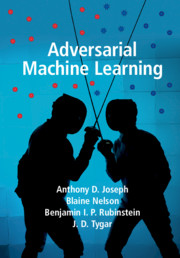
-
Select format
-
- Publisher:
- Cambridge University Press
- Publication date:
- 14 March 2019
- 21 February 2019
- ISBN:
- 9781107338548
- 9781107043466
- Dimensions:
- (247 x 174 mm)
- Weight & Pages:
- 0.84kg, 338 Pages
- Dimensions:
- Weight & Pages:
You may already have access via personal or institutional login
Book description
Written by leading researchers, this complete introduction brings together all the theory and tools needed for building robust machine learning in adversarial environments. Discover how machine learning systems can adapt when an adversary actively poisons data to manipulate statistical inference, learn the latest practical techniques for investigating system security and performing robust data analysis, and gain insight into new approaches for designing effective countermeasures against the latest wave of cyber-attacks. Privacy-preserving mechanisms and the near-optimal evasion of classifiers are discussed in detail, and in-depth case studies on email spam and network security highlight successful attacks on traditional machine learning algorithms. Providing a thorough overview of the current state of the art in the field, and possible future directions, this groundbreaking work is essential reading for researchers, practitioners and students in computer security and machine learning, and those wanting to learn about the next stage of the cybersecurity arms race.
Reviews
'Data Science practitioners tend to be unaware of how easy it is for adversaries to manipulate and misuse adaptive machine learning systems. This book demonstrates the severity of the problem by providing a taxonomy of attacks and studies of adversarial learning. It analyzes older attacks as well as recently discovered surprising weaknesses in deep learning systems. A variety of defenses are discussed for different learning systems and attack types that could help researchers and developers design systems that are more robust to attacks.'
Richard Lippmann - Lincoln Laboratory, Massachusetts Institute of Technology
'This is a timely book. Right time and right book, written with an authoritative but inclusive style. Machine learning is becoming ubiquitous. But for people to trust it, they first need to understand how reliable it is.'
Fabio Roli - University of Cagliari, Italy
Contents
Metrics
Altmetric attention score
Full text views
Full text views help Loading metrics...
Loading metrics...
* Views captured on Cambridge Core between #date#. This data will be updated every 24 hours.
Usage data cannot currently be displayed.
Accessibility standard: Unknown
Why this information is here
This section outlines the accessibility features of this content - including support for screen readers, full keyboard navigation and high-contrast display options. This may not be relevant for you.
Accessibility Information
Accessibility compliance for the PDF of this book is currently unknown and may be updated in the future.


